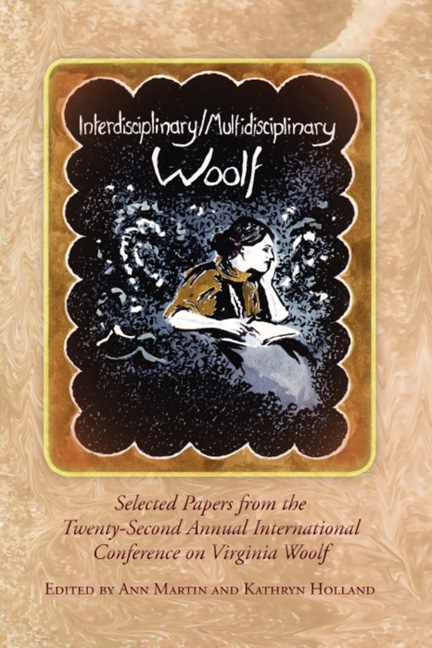Book contents
- Frontmatter
- Contents
- Introduction to Interdisciplinary/Multidisciplinary Woolf
- Acknowledgments
- List of Abbreviations
- History, Materiality, Multiplicity
- Multidisciplinary Woolf / Multiple Woolfs?
- Woolf, History, Us
- “Full of Experiments and Reforms”: Virginia Woolf, John Maynard Keynes, and the Impossibility of Economic Modeling
- Desiring Statues and Ambiguous Sexualities in Jacob's Room
- Challenging the Family Script: Woolf, the Stephen Family, and Victorian Evangelical Theology
- History as Scaffolding: Woolf's Use of The Times in The Years
- Vincent van Gogh, Virginia Woolf, and Old Shoes: A Cross-Cultural Iconography of Historical Truama from the Great War to the Iraq War
- Stopped at the Border: Virginia Woolf and the Criminalization of Dissent in Democratic Societies
- “Q. And babies? A. And babies”: On Pacifism, Visual Truama, and the Body Heap
- Photography, History, and Memoir of the Spanish Civil War: Interdisciplinary Views
- Patterns, Practices, Principles
- Art, Influence, Embodiment
- Publishing, Politics, Publics
- Notes on Contributors
- Conference Program
Desiring Statues and Ambiguous Sexualities in Jacob's Room
from History, Materiality, Multiplicity
- Frontmatter
- Contents
- Introduction to Interdisciplinary/Multidisciplinary Woolf
- Acknowledgments
- List of Abbreviations
- History, Materiality, Multiplicity
- Multidisciplinary Woolf / Multiple Woolfs?
- Woolf, History, Us
- “Full of Experiments and Reforms”: Virginia Woolf, John Maynard Keynes, and the Impossibility of Economic Modeling
- Desiring Statues and Ambiguous Sexualities in Jacob's Room
- Challenging the Family Script: Woolf, the Stephen Family, and Victorian Evangelical Theology
- History as Scaffolding: Woolf's Use of The Times in The Years
- Vincent van Gogh, Virginia Woolf, and Old Shoes: A Cross-Cultural Iconography of Historical Truama from the Great War to the Iraq War
- Stopped at the Border: Virginia Woolf and the Criminalization of Dissent in Democratic Societies
- “Q. And babies? A. And babies”: On Pacifism, Visual Truama, and the Body Heap
- Photography, History, and Memoir of the Spanish Civil War: Interdisciplinary Views
- Patterns, Practices, Principles
- Art, Influence, Embodiment
- Publishing, Politics, Publics
- Notes on Contributors
- Conference Program
Summary
Introduction
The multiple references to statuary in Jacob's Room have generated significant scholarly response over the years, and much of the prior discussion of statuary has focused on the elegiac. For instance, Kathleen Wall contends that “Greek art [and by association, statuary] is used to figure forth Jacob Flanders's mortality and other characters’ sense of loss” (193). I want to examine mainly the eroticism apparent in specific statues and will argue that most (if not all) references to statuary are infused with complex nuances of desire and that much of this statuary is linked directly to Jacob, particularly to his sexual allure and sexual ambiguity in the novel, whether he is the object of desire or is himself aroused.
In the published novel, Jacob is explicitly aligned with four classical Greco-Roman figures—the gods Hermes/Mercury and Dionysus/Bacchus, and the mythical heroes Ulysses and Achilles. In the holograph, Jacob is also implicitly associated with the gods Priapus and, I would argue, more subtly, Hermaphroditus. Jacob's statuesque elements can also be connected to an actual historical figure, Antinous, who has survived in historical memory primarily through the statuary honoring him centuries after his untimely death in 130 CE.
The Missing Statues
In Chapter Eleven of the novel, Woolf focuses on Jacob's visit to France, his first stop on his Continental grand tour. In Paris, he meets Edward Cruttendon and Jinny Carslake with whom he develops a rather complicated relationship that ends badly:
And finally under the arc lamps in the Gare des Invalides, with one of those queer movements which are so slight yet so definite, which may wound or pass unnoticed but generally inflict a good deal of discomfort, Jinny and Cruttendon drew together; Jacob stood apart. They had to separate. Something must be said. Nothing was said. (136-37)
But what has transpired? The aftermath of Jacob's visit to Versailles with his new acquaintances is preserved in the published version of the novel, but the reasons for this discomfort are missing. In the holograph, Woolf includes variant versions of Edward and Jacob's heated argument about art and indecency.
- Type
- Chapter
- Information
- Interdisciplinary/Multidisciplinary Woolf , pp. 27 - 34Publisher: Liverpool University PressPrint publication year: 2013



